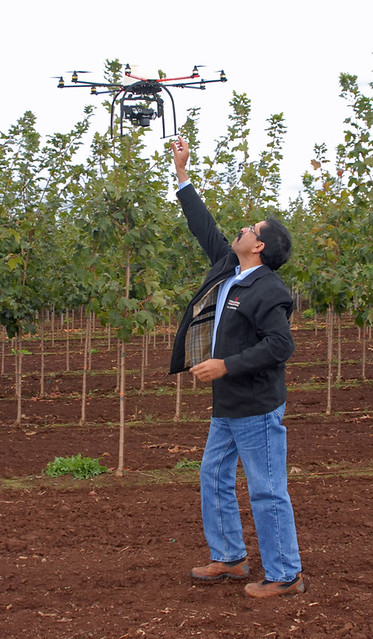Neighbor’s drone overhead? It’s never open season
By Mary Hightower
U of A System Division of Agriculture
(363 words)
(Editor's note: This article is meant for purely educational use it is not meant to constitute legal advice.)
FAYETTEVILLE, Ark. – The proliferation of remotely controlled aerial vehicles, or drones, on the market has been accompanied by a rise in the number of questions about what uses are legal.
Rusty Rumley, senior staff attorney for the National Agricultural Law Center, has fielded more than a few questions about the subject. Here are three of the questions he’s heard recently, and his answers:
Question: Do you have any practical advice for a farmer who discovers one of these devices buzzing around in their buildings or home?
Rumley: “A landowner should never try to shoot them down. You can be sued to recover the cost of the UAV and could potentially face criminal charges. You can contact law enforcement because many current models of UAVs do not have extended ranges, and therefore the person that is controlling it may be physically trespassing on someone's land in order to launch it. You may also be able to sue the UAV operator for nuisance or trespass depending upon the facts and circumstances.”
Question: Can I use a UAV to inspect my own crops without a permit from the FAA?
Rumley: “Not if you sell your crops. The current policy of the FAA is that all commercial uses of a UAV require the operator to obtain a permit. If you are flying a UAV for purely recreational purposes then there is a much lower threshold for operating a UAV, but that would likely not apply to this question.”
Question: Could I use my UAV to catch poachers on our farm legally?
Rumley: “This use may fall into a bit of a gray area. If you are leasing out your farm for hunting purposes to other people then you probably would not be able to use a UAV since keeping off poachers would be a commercial activity. Your land will be more valuable to hunters if you keep poachers off of the property and this could be considered a commercial use. If you are not leasing out the land for hunting purposes then there likely would be no commercial benefit to using the UAV, but you should check with the FAA to ensure that this use is permissible.”
The National Agricultural Law Center is the only agricultural law research and information facility that is independent, national in scope, and directly connected to the national agricultural information network. As a result of the expanding scope of agricultural law and its convergence with related areas, the Center also includes food law in the scope of its coverage.
Recognizing the importance of the Cooperative Extension Service, the Center is also proud to serve as the lead institution for the eXtension Agricultural and Food Law Community of Practice.
This article is meant for purely educational use it is not meant to constitute legal advice.
For more about the center, visit https://nationalaglawcenter.org.
The Arkansas Cooperative Extension Service is an equal opportunity institution. If you require a reasonable accommodation to participate or need materials in another format, please contact your County Extension office (or other appropriate office) as soon as possible. Dial 711 for Arkansas Relay.
Pursuant to 7 CFR § 15.3, the University of Arkansas System Division of Agriculture offers all its Extension and Research programs and services (including employment) without regard to race, color, sex, national origin, religion, age, disability, marital or veteran status, genetic information, sexual preference, pregnancy or any other legally protected status, and is an equal opportunity institution.
# # #
Media Contact: Mary Hightower
Dir. of Communication Services
U of A Division of Agriculture
Cooperative Extension Service
(501) 671-2126
mhightower@uada.edu
Related Links
